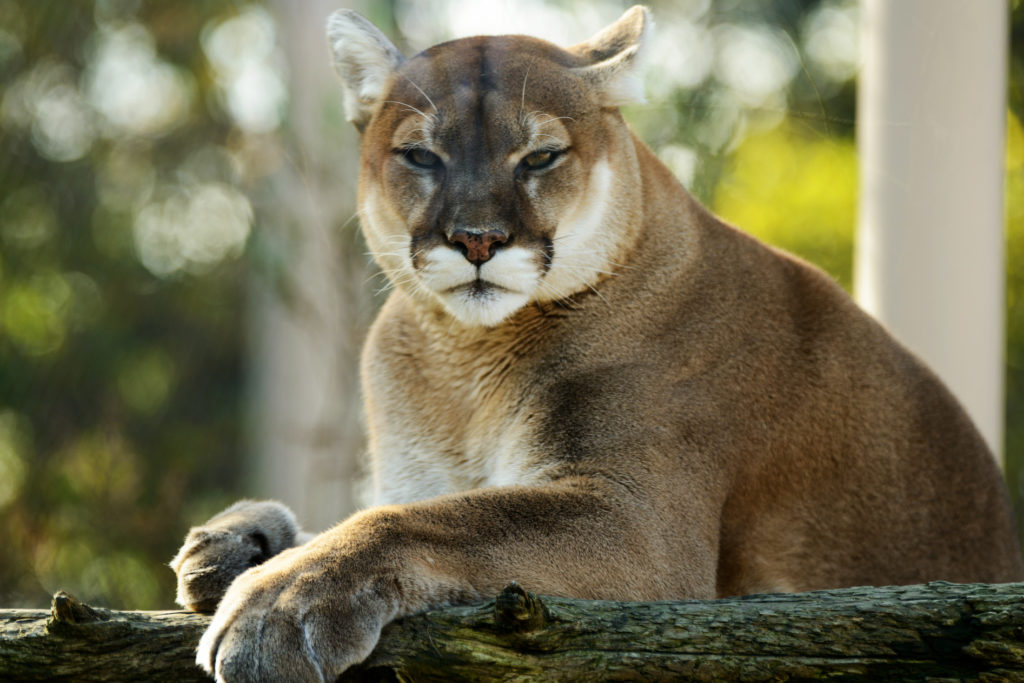Well into its first year, the Predator Release Program on Orcas Island is off to a mixed start.

Let’s review the status of the predators by species:
- Cougar. Shortly after the eight cougars were originally released back in November, they were mercilessly harassed and chased by a local band of stray huskies until they reached their more mountainous habitat away from the urban areas where huskies seem to prefer. All eight seem to have survived well, and were last radio-tracked to individual habitation zones. Females have set up den areas while males mostly play and sneak into town to hang out near the Lower habitat zones.
- Fox: These sly ones were quickly rounded up by the local chicken farmers and sent back to San Juan island. Several have apparently swum back because chickens continue to disappear. One may have been sighted near the Chic Boutique, but that may have been one of the resident foxes.
- Panther: see cougar.
- Alligator: After initially laying low during the cold weather, these huge, armored reptiles are now thriving in all fresh-water lakes. Some have even ventured into the wetlands and estuaries near Eastsound, where several have been seen basking alongside the kayaks at Crescent Beach Kayak rental. The carp problem in Cascade Lake seems to have subsided as a result of these implants, as has the popularity of the wading pond. Yin and Yang.
- Bears: Only grizzly bears have maintained a stable population on Orcas. Other species have apparently swum away to other habitats, perhaps driven off by the larger grizzles. The plentiful, trusting, delicious deer continue to seem totally oblivious to the very carnivorous grizzlies. No negative human encounters have been reported, although several bears have grown tired of having their pictures taken, and others have the distinct smell of chicken on their breaths.
- Puma: see cougars.
- Pterodactyl: Joining with the other soaring predators, these wonderful giants have fit right in with the local ecosystem, taking just their share of sick, old and weak prey species such as deer, squirrels and otters. A few have taken pets, but not many. The ones who did showed genuine remorse and promise not to do it again. Honest. Promise.
- Mountain Lions: see cougars.
- Rattlesnakes: Of the 200 released around Orcas Island this winter, none have been found, except for the one that crawled out of dear old Ms. McAlliston’s toilet. Memorial services will be held at the senior center. Date to be announced.
- Lynx: hard to tell from a cougar, so see cougar.
- Fisher: These crafty relatives of mink have had a field day munching on the fat, lazy local squirrels. Their squeals of delight mixed with the terror-stricken screams of the squirrels have brought new levels of tourist complaints at Moran State Park. “Deal with it,” said head ranger Art Buchannen. “You want nature, here it is. You want peace and quiet, go back to waiting in the ferry line.” Tough love, they call it.
- Jaguar: see cougar.
- Razorback: OK, releasing these aggressive, omnivorous, highly intelligent porkers was a mistake. Hopefully they’ll all be rounded up before they can destroy any more gardens, livestock, pastures and front lawns.
- Civit: see cougar.
- Tasmanian Devils: Like the razorbacks, these transplants did not work out very well. After devouring several meth-heads, they were reluctantly rounded up by law-enforcement officials and sent back to Tasmania. The local meth-head population is expected to recover quickly.
- Panther: see cougar again.
- Covid: These invisible predators were not intentionally released, but they are among the local population now. The herd is restless, especially the old, the sick and the Trump-supporters.
- Bobcat: see cougar.
